October 31, 2022
Celebrate Bunka No Hi (Japanese Culture Day)
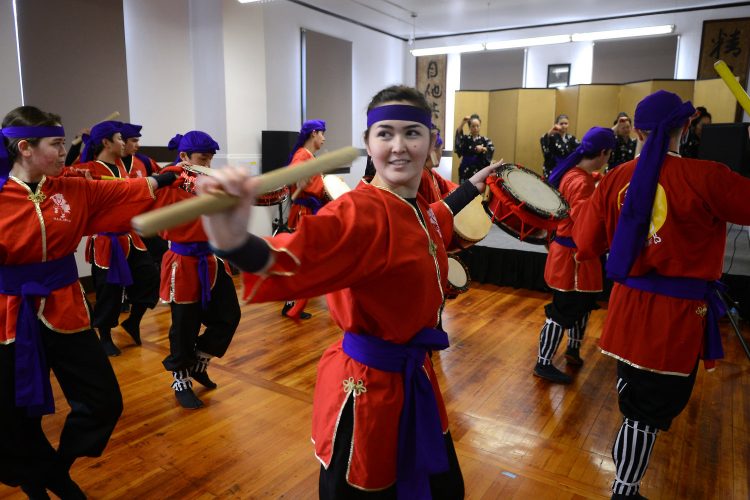
Okinanwa Taiko performs during Bunka no Hi 2018. Photo by Tyler Sipe / Japanese Culture & Community Center of Washington
Many of us, particularly in the Pacific Northwest, enjoy Japanese culture in some way or form. Among the favorites of imported Japanese culture, anime and manga rank high.
You might remember watching Pokémon or Sailor Moon, or reading Death Note and One Piece. The first anime existed as far back as Mickey Mouse himself in the 1900s, and has only increased in popularity since then, inundating our lives in delightful colorful posters and plushies. In fact, the connection to Japanese animation and video games is so strong that there are an annual conventions, Sakura Con and Aki Con, where fans cosplay as their favorite characters!
Bunka no Hi will be celebrated in the Seattle area with a festival November 5.
This love for Japanese media is rivaled only by their cuisine. Ramen comes first in mind for many, ranging from spicy miso, classic soy sauce, to creamy tonkotsu. Sushi is another very popular food here, bolstered further by Seattle’s access to fresh seafood.
If you have opportunity to shop at locally-owned Uwajimaya, you’ll find that Pocky sticks are common staple, ranging from classic chocolate to the more sophisticated green tea flavor. Traditional sweet bean treats such as mochi are also available, as is melon bread. Such items are only a few common Japanese snacks that we enjoy in Washington.
According to Arisa Nakamura of the Japanese Cultural and Community Center of Washington (JCCCW), Bunka no Hi used to be celebrated as the birthday of Emperor Meiji (1852-1912), but in 1948, a few years after WWII ended, it was re-established as a national holiday to celebrate freedom and peace and promote culture. Cultural events and award ceremonies for artists and scholars are held across the country.
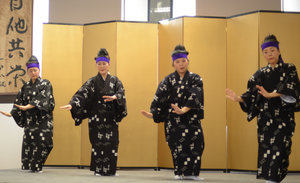
Okinawa performers during Bunka no Hi 2018. Photo by Tyler Sipe / JCCCW
In Seattle, the JCCCW hosts an annual Bunka no Hi event in November, welcoming between 600-800 guests and offering a wide variety of Japanese cultural art experiences for all ages, including cultural and historical exhibitions, music and dance performances, martial arts and tea ceremony demonstrations, craft making and more.
Many other local organizations, cultural specialists, and volunteers support this free event that is open to the public.
Japanese Americans in the Northwest
It would be remiss to share these wonderful elements about Japanese culture on Bunka no Hi without bringing up the history of the Japanese and Japanese Americans who live here. The first generation, the Issei, arrived in the late 1800s-early 1900s. If you watched Picture Bride, you may have heard of the Japanese immigrants who worked in the sugar cane fields of Hawaii.
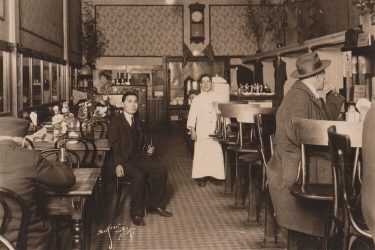
Issei Pioneer Genji Mihara. Photo courtesy JCCCW
In similar fashion, many Japanese people immigrated to places like Hawaii and South America for new lives and opportunities and settled there. Some of their descendants, the Nisei (2nd Generation) or Sansei (3rd generation) later moved to the United States to find jobs in the cities. Many of them made their homes on the mainland and lived quite well.
The 1942 Executive Order 9066 during World War II drastically changed all of this when President Roosevelt authorized all Japanese and Japanese Americans to be forced from their homes and incarcerated inland, urged by anti-Japanese sentiment.
By 1945, camps started closing, but many families had no place to return to as their homes and businesses had been overtaken in their absence. Many came to live in Hunt’s Hostel, or Hunt Hotel as some preferred to call it, a Japanese culture and language school converted to temporarily house the displaced Japanese and Japanese American people.
Hunt Hotel still exists today, reborn as the JCCCW, and continuing the building’s longstanding practice of teaching the next generation Japanese language and culture and currently houses the Nikkei Bunko libraries, the Hosekibako antique store and the Northwest Nikkei Museum dedicated to the local history of Japanese and Japanese Americans.
Strawberry Fields Forever
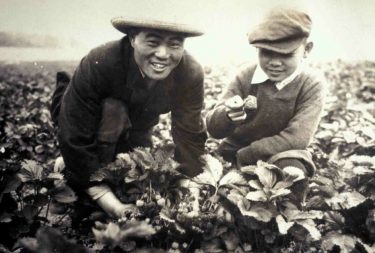
Farm founder B.D. Mukai, c. 1926. Courtesy Mukei Farm & Garden
Mukai Farms & Garden, founded by Issei pioneer B.D. Mukai in 1926 as a strawberry farm, now enjoys being the only public garden on Vashon Island, open 365 days a year from dawn to dusk, and with 107 Ave SW recently given the honorary designation Mukai Way.
According to Mukai Farms representative Rita Brogan, “As far as we know, Mukai Farm & Garden is one of the few – if not only – pre-WWII Japanese farmsteads still standing today. The Mukai Farm was primarily known for Marshal Strawberries. It was one of the largest strawberry farms in the states. They shipped as far as Chicago for Smucker’s jams.”
James Beard called the Mukai farm Marshal strawberries “the most delicious strawberries in the world.”
Learn more about the history of the Mukai Farm & Garden here.
Get Involved
UW offers a variety of Japanese cultural classes including literature, art, history and Japanese language classes. The JCCCW and Mukai Farm offer activities, exhibits, and performances frequently, and there are many other ways to dip your feet into the wide ocean of Japanese and Japanese American culture. Let’s celebrate together!
- Volunteer: Check out JCCCW’s and Mukai Farm & Garden’s websites for more information about events and volunteer opportunities.
- Celebrate: Seattle Center holds the annual Cherry Blossom & Japanese Cultural Festival every year during the spring. A range of Japanese-related events including dances, food, music and beautiful displays can be enjoyed virtually.
- Learn: Densho’s mission is to preserve and share history of WWII incarcerations of Japanese Americans. The JCCCW also offers virtual tours of their Northwest Nikkei Museum.
- Read: interviews with JCCCW and Mukei Farm & Garden staff conducted by UWCFD campaign assistant Camille Nagasawa.
- Watch: The Life of Genji Mihara, Issei Pioneer and Seattle Community Leader
Support
Consider making a one-time contribution or setting up payroll deduction to one of our CFD member organizations working to preserve and celebrate Japanese and Japanese American culture and heritage:
Densho (charity code 1480520): Promoting critical thinking and equal justice through the preservation and examination of the Japanese American experience during WWII.
Japanese Cultural & Community Center of Washington (charity code 1479620): Provides a center in Seattle that celebrates Japanese and Japanese American culture and heritage through educational, cultural, business and social programs that add to the richness and diversity of the region.
Friends of Mukai (charity code 1482358): Historic landmark that represents the work and life of the Japanese American Mukai family from the late 20’s to post WWII.
Japan-America Society of the State of Washington (charity code 1482215): Promotes mutual understanding friendship between the peoples of Japan and Washington State by providing a forum for the exchange of ideas information. Introduces Japanese culture to K-12. Business, public policy and culture events.
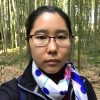 Contributed by Camille Nagasawa
Contributed by Camille Nagasawa
Camille is a UW graduate who double-majored in Japanese and Asian Language and Culture. Her hobbies and passion include Japanese traditional tea ceremony and culture.